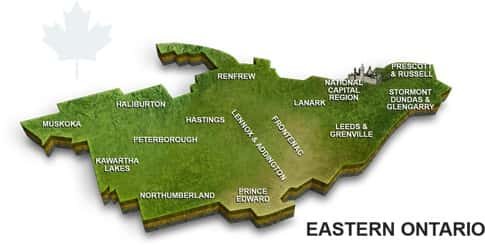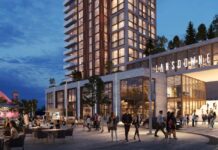Mediation, active adjudication good ideas, but potential decision making limits concern industry
Ottawa Construction News staff writer
The Greater Ottawa Home Builders’ Association (GOHBA) hopes the Ontario government will enhance the Ontario Municipal Board (OMB) by introducing mediation and “active adjudication” concepts to resolve or at least clarify disputes before and during hearings, while it is concerned about possible proposals to restrict the OMB’s ability to make decisions by requiring it to simply ask municipalities to reconsider issues instead of issuing final rulings.
These are among the ideas in an extensive Dec. 19 submission to attorney general Yasir Naqvi and municipal affairs minister Bill Mauro, as the provincial government conducts an extensive review of the OMB’s scope and powers.
Naqvi, speaking to the GOHBA in early December, said the government hopes to have its review completed by the spring and will introduce the amending legislation later this year. He said then there are two certainties. “Abolishment of the OMB is not on the table” and “the status quo cannot continue either.”
GOHBA executive director John Herbert says there are areas of consensus between municipal politicians, planners, community groups and developers, and these changes can certainly be introduced into the OMB.
These improvements include allowing provisions for mediation before formal hearings. “We are of the opinion that many disputes would benefit from mediation in advance of a hearing to reduce or eliminate issues to be dealt with by the board,” the GOHBA said in its submission.
However, mediation may be of limited value in many disputes, in part because of the imbalance between risks and rewards for municipal politicians and community activists, who often want to thwart developers even though the plans fully comply with provincial policies and legislation.
“Much of the time, one of the parties has little to lose and much to gain by continuing with the hearing rather than reaching a compromise,” Herbert said. Municipal elected officials don’t win political points on compromising on a decision that may represent valid planning policy but goes against their constituent’s interests – and they don’t need to pay personally the costs of carrying things to a final decision. Similarly, community associations often “do not retain expert witnesses and so they have little to lose but time in prolonging an OMB hearing whenever possible in the hope that the builder will become financially exhausted and withdraw,” the GOHBA says.
“Under normal circumstances only the builder has an interest in resolving an appeal in order to save time and money and to advance the project. Builders normally incur costs on two fronts with one being expert/legal witnesses and the second additional project carrying costs.”
Herbert also said the GOHBA (and other organizations) also support changes in scope and stream issues, such as whether the issue should even go before the OMB at the outset, and by increasing the standards for submitting ban appeal.
There also is a consensus that the OMB would be more effective if it could work more rapidly but this will cost money. Hiring more adjudicators and implementing a pubic education system will require funding. “GOHBA strongly supports any steps taken by the province to improve in-house expertise of the (OMB) office and expand the Citizen Liaison Office to provide easier public access to information.”
As well, the GOHBA sees some merit in creating circumstances where OMB adjudicators could actively suggest where they are heading and encourage the parties to consider their options while the hearing is underway, through a process known as “active adjudication.” This process may lengthen hearings but the benefits in resolving or at least narrowing disputes may offset the extra time.
The association’s biggest concern is that the government may change the rules to make it so that the OMB does not have the authority to issue a final decision, but instead is restricted to outlining its concerns and returning the file to the municipal government for another review.
This could create a ping-pong problem, because municipal politicians often are caught between their constituencies, especially vocal community groups who may not represent the entire community, and the greater good. Since politicians want to be re-elected, they ignore loud community objections to development at their peril.
This results in circumstances where politicians have little reason to follow provincial planning policy, especially as it relates to intensification, and where the OMB provides a crucial safety valve.
“You have some municipal councillors who truly understand the OMB’s role,” Herbert said. “They know the OMB will make the correct and difficult decisions that the councillors don’t want to make.”
As an example, he said he has heard municipal politicians use words like: “We don’t have the political support, even if it does make sense for planning reasons. Just give it to the OMB – it will give it to you.”
The OMB receives much attention in part because it’s decisions are so visible. “We have may provincially appointed tribunals, but the OMB attracts the most scrutiny because it has the most visible decisions to make.”
OMB reviews are not new – they happen every five years or so, Herbert said. And over time, there have been changes, and so further changes will certainly be welcome.
However, there will be problems if the province truly removes the OMB’s authority and simply hands it back to elected officials. “There are sound bits that the board is usurping powers from elected officials,” he said. But the development rules and what is permitted do not always align with the political will.”
If there are both restrictions on farmland and greenspace development (in the name of intensification) and if intensification results in political opposition because existing neighbours don’t want the new developments in their areas, the pressure will still remain as “people still have to live somewhere,” he said. The results will likely be even further urban sprawl as people move to communities outside the urban area such as Carleton Place, Russell or Gatineau.







